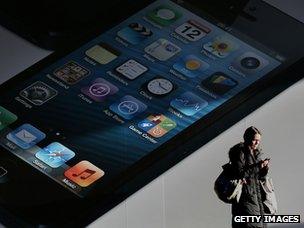Facebook, Apple - and the psychology of markets
- Published
- comments

Look at what's happened on the stock market to two of the best known names in technology over the last three months. One has seen its shares appreciate by more than 50%, the other has seen its value fall by over 20% in the same period. The first is Facebook, the second Apple - and these wild gyrations in their value will do nothing to convince sceptics that there is anything rational about stock markets.
Facebook, of course, had a disastrous debut on the market last May, its shares rapidly falling from an initial price of $38 to below $20. But over the last three months there has been a quiet revival, pushing the price back above $30.
Now markets react to news about companies - so what was the disastrous data that caused the sharp fall and what new information has caused the subsequent recovery? Well, it is hard to see in the financial results published over recent months anything that would have either delighted or spooked the markets. Facebook has continued to deliver the sort of growth in advertising revenues that analysts had predicted when it floated.
Most of the new information the market has seized upon is vague - a reassuring public appearance by Mark Zuckerberg, suggestions that the firm has found new ways of inserting ads into its mobile platform, and today a mysterious product launch at the Facebook's Californian headquarters
But the market which worried - probably correctly - that Facebook was overvalued has now decided that maybe it does have a chance of becoming the big new force in online advertising, rivalling Google. In other words, gut feelings rather than hard facts, are behind the gyrations in the share price.
And the same seems true about Apple. Back in September, as the iPhone 5 launched, its share price soared above $700 in September, making it the world's most valuable business. Now it is hovering just above $500.
What has happened to wipe something like $150bn off its value in just a few months? Apple is still making huge margins on products like the iPhone and the iPad, and has issued no profit warnings or gloomy forecasts. What the market has seized upon are various rumours about weakening sales - most recently a report that Apple had cut orders for components due to worsening prospects for the iPhone 5.

Japan's Nikkei news agency suggested that Apple had reduced by 50% the 65 million LCD screens it ordered for the phones in the first quarter of 2013. No comment of course from Apple - but some analysts pointed out that the most bullish of forecasts for iPhone sales in this quarter was 43 million, so it is difficult to make the Nikkei numbers add up.
No matter - sometimes the market seizes upon any rumour as a reason to buy, and sometimes the opposite is true. Looking at a $700 share price for Apple made many big investors feel giddy, and some have jumped.
One key figure to examine when looking at shares is the price/earnings ratio - the stock market value of the company as a proportion of its current revenues. The higher the number, the more the market is saying it expects the company to grow from now on.
Right now, according to Bloomberg, Facebook has a P/E ratio of 67 - which means that the market expects rapid growth in its value. By contrast, Apple's P/E is somewhere around 10 - similar to Microsoft. In effect, the market is saying that the best days of the firm built by Steve Jobs - just like the one created by Bill Gates - are over. It may go on generating huge profits, but don't expect spectacular growth again. (Google's current P/E ratio is around 18 - so the market is betting its growth story has some way to run.)
Of course, just as we have seen huge swings in Apple and Facebook shares in recent months, everything could change again in 2013. There will eventually be more solid data about both companies, and that will be reflected in their share prices.
The best quote about the way markets behave came from the economist and professional investor Benjamin Graham, a mentor of Warren Buffett: "In the short run," he said, "the market is a voting machine but in the long run it is a weighing machine."
In other words, investors may look like hysterical flibbertigibbets right now - but give them long enough and rationality will win through. How long that will take in the case of Apple and Facebook - and what direction the shares will take - heaven only knows.